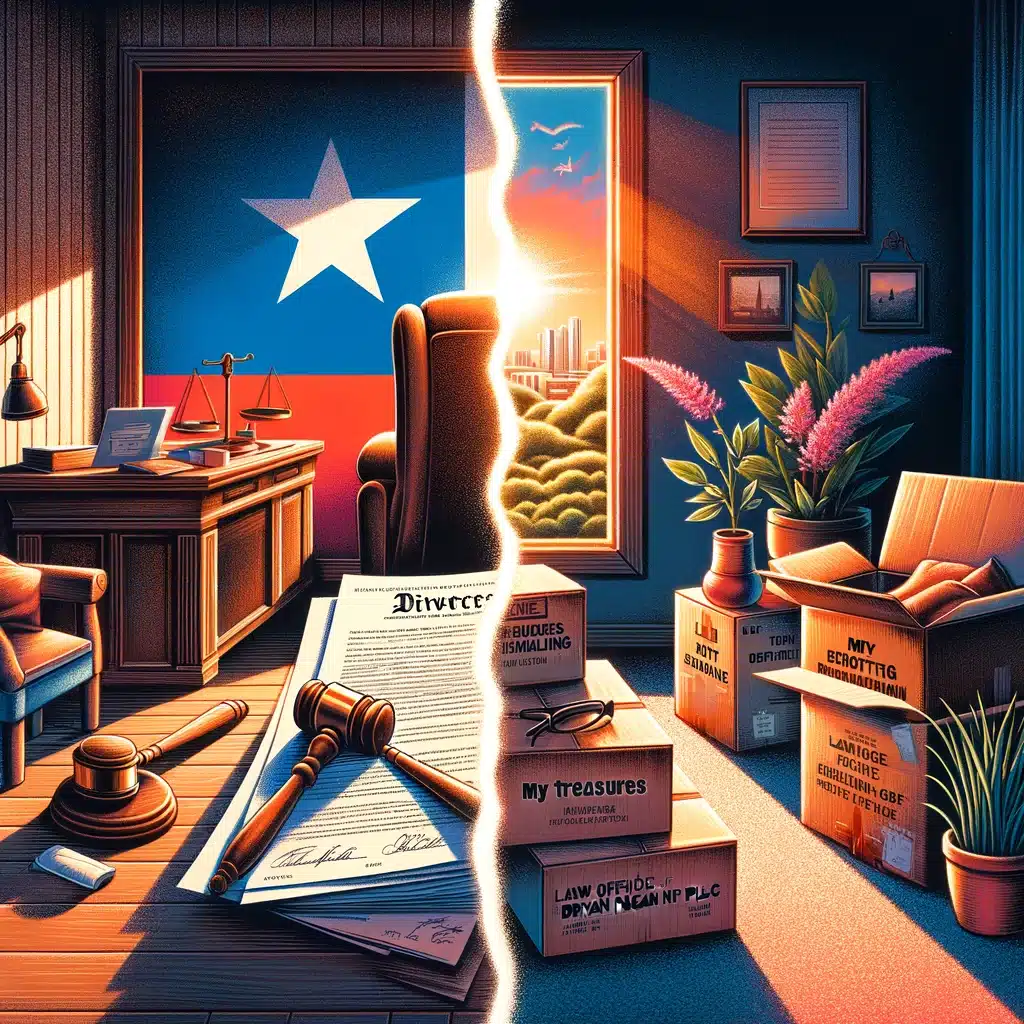Imagine this scenario: You’ve completed the paperwork, said your goodbyes to the trials of marriage, and are eager to embark on a new chapter. Yet, amidst the fresh start, a familiar question lingers: what about the belongings left behind, like that toaster oven your ex adamantly claimed? Thus begins the post-divorce property purge, a narrative fraught with complexity, emotional entanglements, and, occasionally, battles over household appliances. You may find yourself pondering the logistics and timelines of clearing out shared possessions, navigating the delicate balance between closure and practicality in the aftermath of divorce.
Short Answer: Wondering how long you have to get rid of your stuff after a divorce? Well, buckle up because we’re diving headfirst into the delightful world of post-divorce property division!
This journey is far from your average tale of legal jargon and mundane timelines. We’re spicing things up with real-life anecdotes, juicy tips, and enough sass to make even the most seasoned divorcee crack a smile.
So, grab your popcorn (or tissues, depending on your mood), because we’re about to talk embark on a rollercoaster ride through the ins and outs of reclaiming your space post-split. Trust us, you won’t want to miss this!

Navigating Divorce in Texas: Understanding the Timeline and Property Division
A Legal Journey Through Divorce
Embarking on a divorce journey is a life-altering event that immerses individuals in a complex legal maze. One pressing concern often faced is, “Can a spouse throw out my belongings during a divorce?” Guided by the Texas Family Code, this journey from filing the initial divorce petition to receiving the final decree is a structured process aimed at ensuring equity and transparency. Understanding this timeline is crucial for preparing for asset distribution and transitioning to life post-divorce.
The process begins when one partner files a petition for divorce, as mandated by Texas Family Code Section 6.001, which triggers a legal deadline for the other spouse to respond. This initial step paves the way for a series of negotiations, settlement conferences, or trials designed to settle various aspects of the marital dissolution. This includes, but is not limited to, child custody and child support, in accordance with Sections 153.001 to 153.434. These proceedings ultimately lead to a divorce decree, which may be followed by appeals, depending on the complexities of the case.
Equitable Distribution of Assets
At the heart of divorce proceedings lies the division of marital property. This process, as per Sections 7.001 to 7.006 of the Texas Family Code, is based on equitable distribution principles rather than a simple 50/50 split. Factors such as the value of assets, each spouse’s financial situation and earning potential, the length of the marriage, ex spouse’s contributions towards asset acquisition and maintenance, and the tax implications of division are all taken into consideration. This comprehensive evaluation ensures a settlement that acknowledges the contributions and needs of both parties.
Deadline for Retrieval of Personal Belongings
An often overlooked yet critical detail in the divorce decree is setting deadlines for retrieving personal belongings. This becomes especially relevant when one spouse retains the marital home, prompting the pressing inquiry, “How long do you have after a divorce to collect your belongings?” Smooth navigation through this phase hinges on the attorney adhering to the divorce decree’s guidelines, ensuring both parties comply with the established property division and retrieval timelines.
Adherence to the Texas Family Code
Navigating the “Do’s and Don’ts of Getting Divorced in Texas requires a deep dive into the Texas Family Code, which sheds light on the complexities of property division and underscores the necessity of adhering to the divorce decree’s mandates closely. It highlights the critical role of maintaining clear communication and thorough logistical planning, especially when dealing with significant distances or large quantities of property. Avoiding miscommunication and logistical hurdles is crucial, as these issues can lead to delays, underlining the importance of maintaining open lines of communication throughout the process.
Navigating a divorce in Texas, or any jurisdiction, necessitates a comprehensive understanding of the legal framework, from the initiation of the filing to the finalization of asset division. Grounding oneself in the guidelines set forth by the Texas Family Code and ensuring open channels of communication enables individuals to navigate the complexities of divorce with greater clarity and purpose. Adopting this approach not only aims for a fair and equitable resolution for all parties involved but also paves the way for a smoother transition into the next chapter of their lives, aligning with the essential do’s and don’ts of getting divorced in Texas.
Dividing Assets and Retrieving Belongings After a Texas Divorce
Understanding Personal vs. Marital Property
In the aftermath of a Texas divorce, sorting through the complexities of property division is a daunting yet crucial task. The Texas Family Code provides a framework for distinguishing between personal and marital property, setting the stage for an equitable division process. Personal property, as outlined in Sec. 3.001, includes assets owned prior to marriage or received as gifts or inheritances during the union. Conversely, marital property comprises all assets and debts accrued by one spouse during the marriage, as per Sec. 7.001, and is subject to division based on the state’s community property laws.

The Equitable Distribution Principle
Despite Texas’s adherence to community property rules, asset division is not always a simple equal split. Factors such as the marriage’s length, each spouse’s economic status, and contributions toward asset acquisition are considered to ensure a fair distribution (Sec. 7.002). This approach aims to reflect each partner’s contribution to the marriage, recognizing that value extends beyond financial investments.
Setting Deadlines for Property Retrieval
A crucial yet often overlooked aspect of divorce proceedings is establishing a clear timeline for retrieving personal belongings—a question many ex-spouses find themselves asking: “How long do I have to retrieve my ex husband or wife and belongings after a divorce?” To prevent disputes and ensure a smooth transition, the Texas Family Code recommends a minimum period of 30 days from the divorce decree for the retrieval of personal items (Sec. 7.001-7.006). This guideline aids in reducing stress and conflict, allowing both parties adequate time to organize and collect their belongings without undue pressure.
Negotiating the Division of Belongings
Effective negotiation and open communication are essential for a smooth division of belongings. A respectful dialogue between ex-spouses can lead to a mutually agreeable plan for dividing property, minimizing the need for legal intervention. However, when direct negotiation proves difficult, mediation or legal assistance may become necessary. Professional guidance can navigate the intricacies of property division, ensuring adherence to the Texas Family Code and facilitating an agreement that respects both parties’ rights and needs.
Importance of Documentation and Legal Guidance
Meticulous planning and documentation are invaluable in the post-divorce property retrieval process. Keeping detailed records of all related communications, transfers, and transactions provides a safety net in case of disputes or misunderstandings. Such documentation ensures clarity and accountability, simplifying the division process for everyone involved.
By understanding and following the Texas Family Code’s directives, ex-spouses can navigate the challenges of separation, dividing assets and retrieving personal property with dignity and respect. Clear communication, effective negotiation, and adherence to established timelines and legal stipulations pave the way for a smoother transition to life post-divorce and separation, allowing both individuals to move forward with clarity and purpose.
Retrieving Personal Belongings After a Texas Divorce: A Strategic Guide
Navigating the Post-Divorce Transition
The journey following a Texas divorce often involves navigating through a complex legal landscape, especially when it comes to the division and retrieval of personal and marital property. The Texas Family Code serves as a critical guide in these matters, emphasizing the importance of strategic documentation and legal intervention when necessary to ensure fairness and compliance with the court’s decrees.

Documenting Efforts Against Uncooperation
Understanding the difference between personal and marital property, as highlighted in Sections 3.001 and 7.001 of the Texas Family Code, is the first step in the asset division process. However, when faced with an uncooperative ex-spouse unwilling to retrieve their ex wife and belongings, the importance of documenting every attempt at resolution becomes paramount. Utilizing emails, texts, or certified mail to keep a record of communication efforts not only helps in amicably resolving the matter but also prepares you for potential legal disputes.
Seeking Legal Solutions for Property Division
Sometimes, despite all efforts, resolving property division issues may require court intervention. The Texas Family Code outlines mechanisms for enforcing property division, such as an Entry of Judgment by a judge, to ensure compliance with the division decree. In extreme cases, non-compliance by a husband or an former husband or ex-spouse could lead to criminal charges or wage garnishment, underscoring the need for expert legal advice in navigating these disputes.
The Importance of a Comprehensive Inventory
Creating a detailed inventory of items slated for retrieval post-divorce streamlines the process and demonstrates an organized effort to adhere to legal requirements. Sticking to the items explicitly awarded in the divorce decree is crucial; overstepping these boundaries without legal consultation can further complicate the situation. In instances of resistance from an ex-spouse, documented refusals, supported by legal counsel, can help enforce the decree’s terms while protecting your rights.
Prioritizing Safety and Exploring Amicable Resolutions
In cases where safety is a concern, ensuring well-being through arrangements such as police escorts or the presence of a trusted individual during property retrieval is essential. Furthermore, property disputes do not always necessitate a legal battle. Alternative dispute resolution methods like mediation can facilitate mutual agreements without the need for litigation. For high-value assets, seeking professional appraisals can ensure fair distribution and prevent conflicts over asset valuation.
Timeframe for Retrieval: How Long Do You Have?
One pressing concern often is determining the timeframe for retrieving belongings after a divorce. The Texas Family Code suggests a minimum time frame of 30 days post-divorce decree, providing a window that respects both parties’ schedules and emotional states during this transition period. Ensuring clarity on retrieval deadlines within the divorce agreement helps mitigate disputes and allows for a smoother transition for both individuals involved.
In essence, effectively managing the retrieval of personal property following a divorce in Texas—or any jurisdiction—requires diligent documentation, clear communication, and when necessary, the pursuit of legal avenues. By closely adhering to the Texas Family Code and considering negotiation and mediation, individuals can navigate the post-divorce period with respect and dignity, ensuring a fair and amicable resolution for all parties involved.
Embracing New Beginnings: Navigating Post-Divorce Property Retrieval and Space Reclamation
The Legal Path to Reclaiming Your Belongings
In the intricate process of divorce, particularly within the legal framework of Texas, understanding “how long you have to get your stuff after a divorce” becomes a question of both legal significance and personal closure. The Texas Family Code, particularly in Sections 3.001 and 7.001, provides a structured approach to differentiating between personal and marital property, offering clarity on what belongs to whom. However, when an ex-spouse delays or refuses to retrieve their ex spouse’s belongings, the same family law also stipulates a reasonable timeframe—typically 30 to 60 days—for this action. This period is not arbitrary; it’s a thoughtful balance between allowing ample time for collection and moving forward. Documenting efforts to notify your ex-spouse, through certified mail or other traceable means, is not just a formality but a necessary step for legal protection and to facilitate an equitable resolution.

The Emotional Journey of Decluttering Your Space
Beyond the confines of legal proceedings and the complexities that arise, such as how to proceed when a family member dies without a will, lies the deeply personal journey of transforming your living space post-divorce. This transformation goes beyond mere physical decluttering; it’s an essential step in the healing process, allowing you to release the past and make space for new beginnings. Personalizing your space—whether it’s through redecoration, rearranging furniture, or introducing new colors—can have a profound impact on your emotional recovery. It’s about crafting a sanctuary that mirrors your current self, untethered from the shadows of past resentments. Deliberately engaging in this process can serve as a powerful affirmation of your independence and a declaration of your renewed identity.
Navigating Property Division with Legal Expertise
The division of property, while grounded in the legalities of the Texas Family Code, involves navigating a complex interplay of emotional and logistical challenges. Seeking the expertise of a family law attorney not only provides you with a comprehensive understanding of your rights and obligations but also ensures that the division of assets is conducted fairly, taking into account factors such as the length of the marriage and each spouse’s contributions. In situations where direct contact or negotiation with an ex-spouse proves challenging, legal counsel becomes indispensable, advocating for your interests and facilitating a resolution that respects both parties’ rights.
Laying the Groundwork for a Brighter Future
Ultimately, the process of reclaiming your space and belongings post-divorce is about more than just physical items; it’s about laying the foundation for your future. The Texas Family Code, while guiding the legal aspects, also indirectly supports your journey towards emotional and personal renewal. As you navigate through these changes, remember that this period is not just about ending a chapter but about redefining your life on your terms. Through careful legal preparation, mindful decluttering, and personal reimagining of your space, you can step into the next chapter of your life with confidence and a sense of renewed purpose.
Navigating Divorce in Texas: Understanding Property Rights and Retrieval Timelines
The Legal Journey Through Divorce and Property Division
Divorce in Texas is more than a legal procedure; it’s an emotional voyage that often centers around the division of belongings. At the Law Office of Bryan Fagan PLLC, we understand the complexities and emotional nuances this process entails, especially when it comes to concerns like, “Can my spouse discard or sell my belongings during the divorce?”

Distinguishing Between Marital and Personal Property
Central to resolving such concerns is grasping the distinction between marital and personal property, as the Texas Family Code clearly delineates. Marital property, encompassing assets acquired during the marriage, falls under equitable distribution according to Sections 3.001 and 7.001. In contrast, personal property includes assets owned prior to marriage or received as gifts or inheritances, with ownership rights remaining with the individual. This legal distinction ensures a fair division of assets, aligning with both parties’ rights and contributions.
Handling Marital Assets: Legal Considerations
It’s crucial to approach the division of marital assets with caution. Actions that could be perceived as depleting these assets—such as selling, hiding, or wastefully spending—can lead to adverse legal consequences. Texas law discourages such actions, often adjusting the settlement to penalize the offending spouse. For those looking to protect certain assets, legal instruments like prenuptial or postnuptial agreements offer a clear delineation of separate and marital and property rights, safeguarding individual interests within the bounds of the law.
Reclaiming Your Space: A Post-Divorce Priority
Post-divorce, the focus shifts to decluttering and transforming your living space, an essential step in moving forward. This period allows for a symbolic release of the past, as you clear out items that no longer serve your new life direction. Negotiating the division of shared household items and establishing a clear timeline for your ex to retrieve their belongings are critical steps in this process, helping you to reclaim your space and start anew.
Legal Solutions for Asset Dissipation
When faced with the dissipation of marital assets, legal intervention becomes necessary. Our team at the Law Office of Bryan Fagan PLLC excels in guiding clients through these challenges, ensuring the equitable division of property and advocating for your rights throughout the process.
Prioritizing Safety in Contentious Situations
In cases where domestic abuse is a factor, your safety is paramount. The Texas Family Code provides a framework for property division and domestic abuse but also emphasizes the importance of personal safety. Our attorneys are ready to advise on the safest strategies for retrieving personal items, ensuring your well-being is protected.
Broadening the Scope of Asset Division
The division of assets in a divorce often extends beyond the marital home, including items in storage units or secondary properties. Our expertise encompasses navigating the intricacies of agreements that ensure fair access and retrieval opportunities for both parties, regardless of the assets’ location. This process is akin to understanding “The Pros and Cons of Subleasing: What You Need to Know,” as it involves careful consideration of rights, responsibilities, and the equitable distribution of property. Just as with subleasing, where both advantages and disadvantages must be weighed, our approach aims to balance the interests of all involved parties to facilitate a fair and just resolution.
Understanding Retrieval Timelines
A common post-divorce question is related to the timeline for retrieving personal belongings. “How, how long do you have to get your stuff after a divorce? I have to get my stuff after a divorce?” is a concern that many face. With our experienced attorneys, you’ll navigate these timelines effortlessly, supported by the comprehensive legal framework of the Texas Family Code.
At the Law Office of Bryan Fagan PLLC, we’re more than just legal advisors; we’re partners in your journey through the complexities of divorce in Texas. By leveraging our in-depth knowledge of family law and the Texas Family Code and providing compassionate support, we ensure you emerge from this process not just surviving but thriving, ready to embrace the future with confidence.
Navigating the Aftermath of Divorce in Texas: Reclaiming Your Belongings and Space
Embarking on a Personal and Legal Recovery
The journey through divorce in Texas encompasses both deep emotional healing and navigating complex legal waters, particularly when untangling the intertwined lives of shared belongings. At the Law Office of Bryan Fagan PLLC, we stand at the intersection of emotional support and legal guidance, understanding the unique pain that comes with separating from a partner, especially under the shadow of infidelity. Such separations can stir a whirlwind of emotions, from anger and sadness to the frustration of dealing with lingering possessions.

Understanding Your Rights to Property
A significant part of moving forward involves addressing the dilemma of “how long do you have to retrieve your belongings after a divorce?” This question is especially pertinent when your space is still populated by reminders of a relationship now past. The Texas Family Code offers clarity, distinguishing between marital property, acquired during the marriage and subject to equitable distribution, and personal property, which you owned before the marriage or received as gifts or inheritances. This distinction is vital for fair asset division but navigating this process can often exacerbate emotional turmoil.
Choosing Civility Over Conflict
The presence of an empty house and ex-partner’s belongings can painfully echo past shared moments, tempting some to drastic measures like changing locks or outright disposing of these reminders. Yet, legal and emotional prudence calls for a higher road. The Texas Family Code cautions against unilaterally altering property access if the property is jointly owned, and similarly, advises against the destruction of personal belongings due to the legal and emotional repercussions that can follow.
Strategies for Peaceful Property Division
In lieu of succumbing to the impulse for retribution, adopting constructive approaches, such as securing a storage unit for an ex-partner’s belongings, provides a practical solution that respects both the house and legal boundaries and a person of personal dignity. This action not only facilitates the physical and emotional process of moving on but also adheres to the principles of amicable property division, ensuring a respectful distance from ongoing emotional triggers.
The Comprehensive Path to Settlement
The scope of a divorce attorney’s role in settlements extends beyond the immediate concern of physical belongings, delving into financial adjustments, child custody considerations, and the fair allocation of digital and intangible assets. Want to make visitations easier for your children after a divorce? With the guidance of the Law Office of Bryan Fagan PLLC, navigating the complexities of divorce for the equitable distribution of retirement accounts and jointly owned property becomes a structured journey. This process aims for a resolution that honors the contributions and rights of both parties while also focusing on creating a supportive and manageable post-divorce family dynamic for children.
Rebuilding and Reclaiming Post-Divorce
In the aftermath of a divorce, redefining your living space is not just about removing physical items; it’s an integral part of the healing process. Through respectful communication and strategic legal planning, transitioning into this new chapter of life becomes less daunting. The Law Office of Bryan Fagan PLLC is committed to guiding you through the intricacies of Texas divorce law, offering the empathy and expertise necessary to face this challenging time with confidence and a sense of renewal.
With our support, you’re not merely surviving the aftermath of a divorce; you’re laying down the foundations for a future filled with clarity, strength, and the promise of new beginnings.
Navigating Divorce in Texas: Securing Your Belongings and Peace of Mind
Embarking on a Divorce Journey with Compassion and Legal Precision
Divorce, a path fraught with emotional upheaval and legal intricacies, often casts a spotlight on the sensitive issue of personal belongings entwined in the shared spaces of a former marital home. At the Law Office of Bryan Fagan PLLC, we are deeply attuned to the emotional and legal dimensions of divorce, especially the challenges posed by the division of personal items that carry not just monetary value but a tapestry of memories and emotions.

A Careful Inventory: The First Step to Clarity
Crafting a smooth path through the division of personal belongings begins with meticulous preparation. Creating a detailed inventory of personal items early in the divorce proceedings is vital. This list, which should include each item you wish to retain and its estimated value, serves as a foundational document for negotiations, ensuring nothing is overlooked or forgotten amidst the emotional chaos of separation.
Amicable Division: The Ideal Approach
Whenever feasible, mutual notice and agreement on the division of lower-value personal items can greatly streamline the process. Such agreements are particularly suited for items valued at under $500—like clothing or personal effects. However, the Texas Family Code urges caution with higher-value assets, advocating for clear communication to avoid disputes over community property.
When Consensus Fails: The Role of Legal Intervention
In cases where reaching an amicable agreement on property division proves elusive, mediation or a court order may become necessary to clearly delineate the division of personal items. Settlement agreements, often detailed and enforceable by the court or law enforcement, play a crucial role in these situations, guided by the fairness principles outlined in the Texas Family Code. This is especially pertinent if you’re wondering, “Where do I file for divorce if my ex fled the state with my kids?” Such circumstances add layers of complexity to the divorce process, necessitating skilled legal guidance to navigate jurisdictional issues and ensure the fair and just division of assets, all while addressing the additional challenges of cross-state legal matters.
Preserving Personal Property: Understanding Legal Duties
Both parties are typically expected to safeguard marital assets during divorce proceedings. Texas law discourages actions like selling or discarding an ex-spouse offending spouse’s belongings without agreement. However, mutual consent to dispose of unwanted items underscores the significance of communication and cooperative decision-making.
Beyond Material Assets: Comprehensive Legal Support
The divorce process involves more than just dividing belongings—it encompasses the equitable division of debts, updating estate plans, caring for pets, and dividing business assets. Each element demands thoughtful legal consideration to achieve a fair and comprehensive settlement. The Law Office of Bryan Fagan PLLC excels in navigating these multifaceted aspects of divorce, providing expert legal advice that extends beyond the immediate concerns of personal property division.
Finding Closure and a New Beginning
One question many individuals face post-divorce is “how long do I have to retrieve my belongings after the divorce?” Addressing this and other concerns early on with the guidance of experienced legal counsel ensures a thorough and equitable resolution. With the Law Office of Bryan Fagan PLLC as your attorney and your ally, you’re supported every step of the way through the complexities of divorce under Texas law.
Divorce signifies the close of one chapter and the dawn of another. With our team’s empathy and legal expertise, you’re not just navigating a legal process; you’re setting the stage for a future defined by clarity, strength, and the promise of new beginnings. Let us help you transition into this next phase of your life with dignity and peace of mind.
Conclusion: Navigating the Terrain
And there you have it, readers! We’ve journeyed through the emotional rollercoaster of post-divorce property purging, equipped with humor, insight, and perhaps a few too many tissues.
But fret not, for the conclusion of this blog marks only the start of your property division odyssey! Whether you’re negotiating over cherished pets or embarking on a quest to reclaim family heirlooms, remember: you’re more than capable.
So, as you bid farewell to your ex’s old college t-shirts (good riddance, are we right?), let’s toast to newfound independence, fresh starts, and the boundless opportunities ahead.
And if you ever find yourself embroiled in toaster oven drama once more, know that we’re here with laughter, solidarity, and a healthy dose of sass. Until next time, stay resilient, keep navigating through, and may your property always be in your favor!

Ebook
![Adobe Stock 62844981[2]](https://www.bryanfagan.com/images/AdobeStock_62844981[2].jpeg) If you want to know more about what you can do, CLICK the button below to get your FREE E-book: “16 Steps to Help You Plan & Prepare for Your Texas Divorce”
If you want to know more about what you can do, CLICK the button below to get your FREE E-book: “16 Steps to Help You Plan & Prepare for Your Texas Divorce”
![Divorce Wasting Assets[4]](https://www.bryanfagan.com/images/Divorce-wasting-assets[4].jpeg) If you want to know more about how to prepare, CLICK the button below to get your FREE E-book: “13 Dirty Tricks to Watch Out For in Your Texas Divorce, and How to Counter Them” Today!”
If you want to know more about how to prepare, CLICK the button below to get your FREE E-book: “13 Dirty Tricks to Watch Out For in Your Texas Divorce, and How to Counter Them” Today!”
Other Articles you may be interested in:
- Why is Separate Property Important and How to Keep it Separate in a Texas Divorce?
- What Wikipedia Can’t Tell you About Texas Divorce and Marital Property Division
- Texas Divorce Property Division Enforcement
- Separate Property in a Texas Divorce?
- Does it Matter Whose Name is on Title or Deed of Property in a Divorce in Texas?
- Is Social Security Considered Separate Property in a Texas Divorce
- Business Owners and Business Assets in a Texas Divorce
- What to do when your divorce decree does not include a marital asset?
- High Net Worth Divorce / High Asset Divorce
- Geographic Restrictions in Child Visitation Orders in Texas
- How Long Will My Texas Divorce Take?
Frequently Asked Questions
What if my wife refuses to leave the house after divorce?
If your wife refuses to leave the house after divorce, it can complicate the situation. Legal procedures and court orders play a role in determining property division and occupancy rights. It’s advisable to consult with a divorce attorney to understand your options and rights.
Can divorced couples stay in the same house?
Divorced couples can technically stay in the same house, but it’s often not recommended due to potential conflicts and emotional challenges. If you have concerns about sharing a residence after divorce, it’s best to consult legal experts and consider the implications.
Can a spouse be forced to leave home?
Whether a spouse can be forced to leave the home depends on various factors, including legal proceedings and court orders. In some cases, protective orders or temporary injunctions may be issued to ensure the safety and well-being of both parties. Consulting with legal professionals is crucial in such situations.
What if I want a divorce but my husband won’t leave?
If you want a divorce but your husband won’t leave the home, it can lead to complexities in the divorce process. Legal guidance is essential to understand your rights and explore options for property division and living arrangements. An experienced divorce attorney can provide the necessary advice and steps to take in this scenario.
Bryan Fagan, a native of Atascocita, Texas, is a dedicated family law attorney inspired by John Grisham’s “The Pelican Brief.” He is the first lawyer in his family, which includes two adopted brothers. Bryan’s commitment to family is personal and professional; he cared for his grandmother with Alzheimer’s while completing his degree and attended the South Texas College of Law at night.
Married with three children, Bryan’s personal experiences enrich his understanding of family dynamics, which is central to his legal practice. He specializes in family law, offering innovative and efficient legal services. A certified member of the College of the State Bar of Texas, Bryan is part of an elite group of legal professionals committed to ongoing education and high-level expertise.
His legal practice covers divorce, custody disputes, property disputes, adoption, paternity, and mediation. Bryan is also experienced in drafting marital property agreements. He leads a team dedicated to complex family law cases and protecting families from false CPS allegations.
Based in Houston, Bryan is active in the Houston Family Law Sector of the Houston Bar Association and various family law groups in Texas. His deep understanding of family values and his professional dedication make him a compassionate advocate for families navigating Texas family law.




